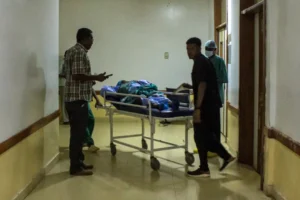International Monetary Fund Staff Completes 2018 Article IV Discussions with Cabo Verde
WASHINGTON D.C., United States of America, January 29, 2018/ — Output growth is expected to accelerate to 4.3 percent in 2018. The IMF staff team recommends deepening the impressive fiscal consolidation efforts of recent years and completing the restructuring of state-owned enterprises. Financial stability indicators have improved, but the high level of non-performing loans and low profitability need to be addressed.
An International Monetary Fund (IMF) staff team led by Max Alier visited Praia from January 15–26, 2018, to conduct discussions on the 2018 Article IV consultation.
At the conclusion of the visit, Mr. Alier issued the following statement:
“The economic recovery is gaining momentum reflecting a more favorable external environment and the payoff of ongoing economic reforms. In 2017, the economy is estimated to have expanded by 4 percent supported by the double digit-growth in tourist arrivals, the recovery in credit to the private sector, and stronger consumer and business confidence. These factors are expected to boost growth further to 4.3 percent in 2018. Over the medium term real GDP growth is projected to stabilize at around 4 percent underpinned by investor confidence stemming from the decisive implementation of the authorities’ reform program.”
“Cabo Verde achieved an impressive fiscal consolidation in recent years but reducing public debt has proven difficult, owing in part to the depreciation of the escudo vis-à-vis the US dollar but also reflecting the need to support loss-making state-owned enterprises (SOEs). In 2017, the budget deficit is estimated to have narrowed to 3 percent of GDP and public debt to have declined to 126.5 percent of GDP, the first decline in a decade. The 2018 budget deficit target of 3.1 percent of GDP is feasible but will require decisive efforts to continue strengthening the tax and customs administration directorate, and ensuring that the public assets sales delayed last year materialize in 2018”.
“Going forward, the team recommends deepening fiscal consolidation efforts and accelerating the restructuring of SOEs. Eliminating their need for government support, in particular for the airline (TACV), housing (IFH) and power (ELECTRA) companies would open room for faster growth in credit to the private sector, boost investor confidence, accelerate medium-term growth, put public debt on a downward path, and reduce the risk of external debt distress.”
“The success of the fiscal strategy hinges on structural reforms to strengthen fiscal institutions and contain fiscal risks. Plans to approve a new organic budget law aimed at broadening the coverage of the budget to include the non-financial public sector, and introducing a debt ceiling are welcome. In order to strengthen domestic revenue mobilization, the team recommends revisiting existing tax expenditures and avoiding granting additional tax exemptions that erode the tax base.”
“The Banco de Cabo Verde’s (BCV) monetary policy stance has been appropriate in the absence of pressures on reserves and consistent with the objective of protecting the peg. Measures adopted last June to strengthen the monetary transmission mechanism are welcome.”
“Plans to adopt a new foreign exchange law and a new BCV organic law are welcome. Consolidating the existing foreign exchange legislation and liberalizing the already de facto open capital and financial accounts will support efforts to further integrate Cabo Verde in the global economy.”
“The team welcomes the BCV’s efforts to strengthen banking sector regulation and supervision. Financial stability indicators have improved but the high level of non-performing loans (NPLs) and low profitability need to be addressed. A solution to the high level of legacy NPLs should be a priority and further forbearance of requirements to write off irrecoverable loans should be avoided.”
“The loss of correspondent banking relations (CBRs) represents a vulnerability given Cabo Verde’s reliance on migrant remittances and deposits. Preventing and possibly reversing the loss of CBRs over time would be facilitated by strengthening ongoing measures for an effective cooperating with other jurisdictions on tax issues.”
“Steady implementation of structural reforms is critical to boost potential growth, foster job creation, and reduce poverty. Improving the quality of education and training are central to increase productivity and address the high levels of youth and women unemployment. Adequately protecting the poor requires strengthening and improving the targeting of social program and protecting social spending from the fiscal consolidation efforts.”
“The team met with Prime Minister Ulisses Correia e Silva, Deputy Prime Minister and Minister of Finance Olavo Correia, Minister of Tourism, Transport, and Maritime Economy José Gonçalves, Central Bank Governor João Serra, other government officials of the executive branch and state-owned enterprises. The team also met with members of the Finance Commission of the National Assembly, representatives of labor unions, development partners, and the private sector. The team thanks the authorities for their cooperation and hospitality.”
The IMF Executive Board is expected to discuss the 2018 Article IV consultation in March 2018.





